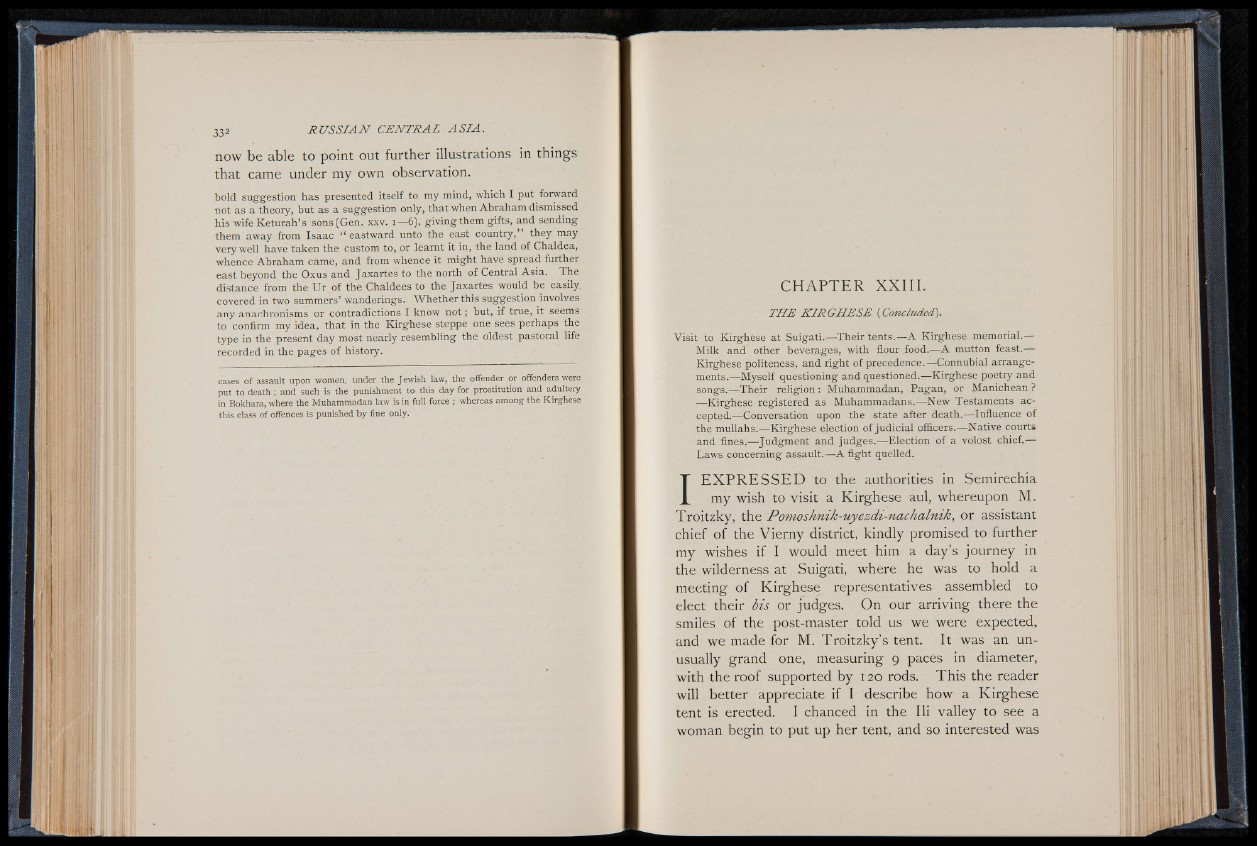
now be able to point out further illustrations in things
that came under my own observation.
bold suggestion has presented itself to my mind, which I put forward
not as a theory, but as a suggestion only, that when Abraham dismissed
his wife Keturah’ s sons (Gen. xxv. i— 6), giving them gifts, and sending
them away from Isaac “ eastward unto the east country,” they may
very well have taken the custom to, or learnt it in, the land of Chaldea,
whence Abraham came, and from whence it might have spread further
east beyond the Oxus and Jaxartes to the north of Central Asia. The
distance from the Ur of the Chaldees to the Jaxartes would be easily,
covered in two summers’ wanderings. Whether this suggestion involves
any anachronisms or contradictions I know n o t ; but, if true, it seems
to confirm my idea, that in the Kirghese steppe one sees perhaps the
type in the present day most nearly resembling the oldest pastoral life
recorded in the pages of history.
cases of assault upon women, under the Jewish law, the offender or offenders were
put to death ; and such is the punishment to this day for prostitution and adultery
in Bokhara, where the Muhammadan law is in full force ; whereas among the Kirghese
this class of offences is punished by fine only.
C H A P T E R X X I I I .
TH E K IR G H E S E (Concluded).
Visit to Kirghese at Suigati.— Their tents.— A Kirghese memorial,—
Milk and other beverages, with flour .food.— A mutton feast.—
Kirghese politeness, and right of precedence.— Connubial arrangements.—
Myself questioning and questioned.— Kirghese poetry and
songs.— Their re ligion: Muhammadan, Pagan, or Manichean ?
— Kirghese registered as Muhammadans, A-New Testaments accepted.—
Conversation upon the state after death .- I nfluence of
the mullahs.— Kirghese election of judicial officers.— Native courts
and fines,-—Judgment and judg es.— Election of a volost chief.—
Laws concerning assault.— A fight quelled.
I E X P R E S S E D to the authorities in Semirechia
my wish to visit a Kirghese aul, whereupon M.
Troitzky, the Pomoshnik-uyezdi-nachalnik, or assistant
chief of the Vierny district, kindly promised to further
my wishes if I would meet him a day’s journey in
the wilderness at Suigati, where he was to hold a
meeting of Kirghese representatives assembled to
elect their bis or judges. On our arriving there the
smiles of the post-master told us we were expected,
and we made for M. Troitzky’s tent. It was an unusually
grand one, measuring 9 paces in diameter,
with the roof supported by 120 rods. This the reader
will better appreciate if I describe how a Kirghese
tent is erected. I chanced in the Ili valley to see a
woman begin to put up her tent, and so interested was